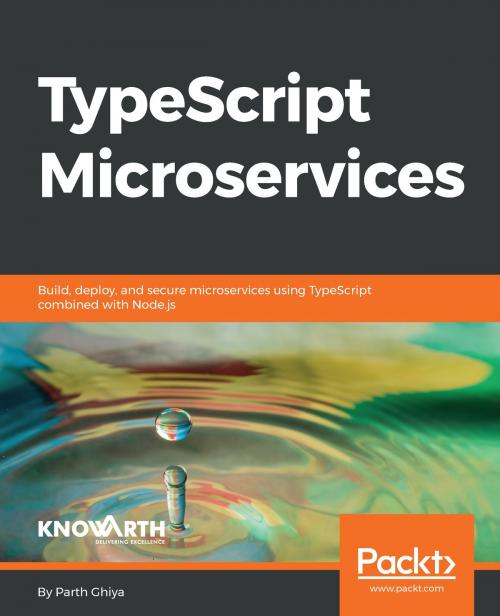TypeScript Microservices
Build, deploy, and secure Microservices using TypeScript combined with Node.js
Nonfiction, Computers, Programming, Programming Languages, CGI, JavaScript, Perl, VBScript, Internet, Web Development| Author: | Parth Ghiya | ISBN: | 9781788836852 |
| Publisher: | Packt Publishing | Publication: | May 30, 2018 |
| Imprint: | Packt Publishing | Language: | English |
| Author: | Parth Ghiya |
| ISBN: | 9781788836852 |
| Publisher: | Packt Publishing |
| Publication: | May 30, 2018 |
| Imprint: | Packt Publishing |
| Language: | English |
Build robust microservice-based applications that are distributed, fault tolerant, and always available
Key Features
- Learn to build message-driven services for effective communication
- Design microservices API using Reactive programming design patterns
- Deploy, scale and monitor microservices for consistent high performance
Book Description
In the last few years or so, microservices have achieved the rock star status and right now are one of the most tangible solutions in enterprises to make quick, effective, and scalable applications. The apparent rise of Typescript and long evolution from ES5 to ES6 has seen lots of big companies move to ES6 stack. If you want to learn how to leverage the power of microservices to build robust architecture using reactive programming and Typescript in Node.js, then this book is for you.
Typescript Microservices is an end-to-end guide that shows you the implementation of microservices from scratch; right from starting the project to hardening and securing your services. We will begin with a brief introduction to microservices before learning to break your monolith applications into microservices. From here, you will learn reactive programming patterns and how to build APIs for microservices. The next set of topics will take you through the microservice architecture with TypeScript and communication between services. Further, you will learn to test and deploy your TypeScript microservices using the latest tools and implement continuous integration. Finally, you will learn to secure and harden your microservice.
By the end of the book, you will be able to build production-ready, scalable, and maintainable microservices using Node.js and Typescript.
What you will learn
- Get acquainted with the fundamentals behind microservices.
- Explore the behavioral changes needed for moving from monolithic to microservices.
- Dive into reactive programming, Typescript and Node.js to learn its
- fundamentals in microservices
- Understand and design a service gateway and service registry for your
- microservices.
- Maintain the state of microservice and handle dependencies.
- Perfect your microservice with unit testing and Integration testing
- Develop a microservice, secure it, deploy it, and then scale it
Who this book is for
This book is for JavaScript developers seeking to utilize their Node.js and Typescript skills to build microservices and move away from the monolithic architecture. Prior knowledge of TypeScript and Node.js is assumed.
Build robust microservice-based applications that are distributed, fault tolerant, and always available
Key Features
- Learn to build message-driven services for effective communication
- Design microservices API using Reactive programming design patterns
- Deploy, scale and monitor microservices for consistent high performance
Book Description
In the last few years or so, microservices have achieved the rock star status and right now are one of the most tangible solutions in enterprises to make quick, effective, and scalable applications. The apparent rise of Typescript and long evolution from ES5 to ES6 has seen lots of big companies move to ES6 stack. If you want to learn how to leverage the power of microservices to build robust architecture using reactive programming and Typescript in Node.js, then this book is for you.
Typescript Microservices is an end-to-end guide that shows you the implementation of microservices from scratch; right from starting the project to hardening and securing your services. We will begin with a brief introduction to microservices before learning to break your monolith applications into microservices. From here, you will learn reactive programming patterns and how to build APIs for microservices. The next set of topics will take you through the microservice architecture with TypeScript and communication between services. Further, you will learn to test and deploy your TypeScript microservices using the latest tools and implement continuous integration. Finally, you will learn to secure and harden your microservice.
By the end of the book, you will be able to build production-ready, scalable, and maintainable microservices using Node.js and Typescript.
What you will learn
- Get acquainted with the fundamentals behind microservices.
- Explore the behavioral changes needed for moving from monolithic to microservices.
- Dive into reactive programming, Typescript and Node.js to learn its
- fundamentals in microservices
- Understand and design a service gateway and service registry for your
- microservices.
- Maintain the state of microservice and handle dependencies.
- Perfect your microservice with unit testing and Integration testing
- Develop a microservice, secure it, deploy it, and then scale it
Who this book is for
This book is for JavaScript developers seeking to utilize their Node.js and Typescript skills to build microservices and move away from the monolithic architecture. Prior knowledge of TypeScript and Node.js is assumed.















